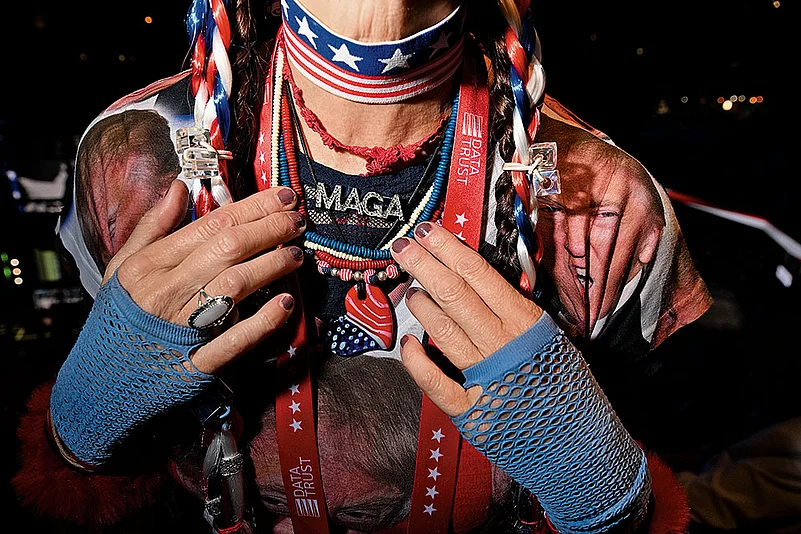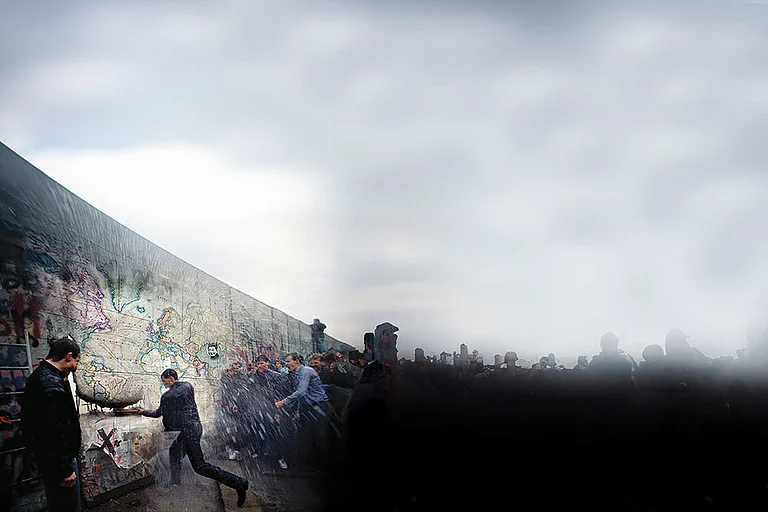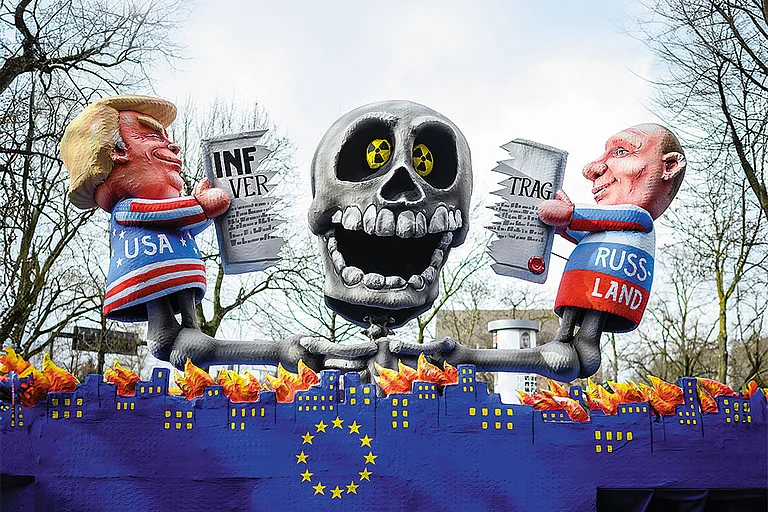On February 28, the world watched in shock as newly elected US President Donald Trump reprimanded Ukraine President Volodymyr Zelenskyy in full glare of the world media at the Oval Office.
This was only the latest in Trump라이브 바카라 absolute disregard for norms of diplomatic niceties, following up on his statements on acquiring Greenland, on the Panama Canal, and his suggestion that Canada should be the 51st state of the US. It looks like US foreign policy is being turned on its head, and that too by its own president. What then does Trump mean for American foreign policy, global politics and the Liberal International Order (LIO), of which the US has been the principal exponent?
Since the end of World War II, international politics has functioned under the rules-based LIO. This order is a system of laws, rules and norms—like respect for sovereignty, free trade and open markets, international institutions, peaceful settlement of disputes and the rule of law. The role of the US in providing global public goods—such as security and stability in key regions through its economic and military power—has been the key to the sustenance of this order, even more so since the end of the Cold War. Promoting this order through support to globalisation, democracy, human rights and providing security guarantees to partners and allies while safeguarding the pre-eminence of the US has been the most enduring part of the American grand strategy. The establishment of the US dollar as the world라이브 바카라 reserve currency further cemented US leadership in the order. It is this order that Trump—to the dismay of many Western politicians and academics—is threatening to upend.
However, the order has been in crisis for quite some time, with the world gradually moving towards multipolarity with the rise of new powers like China, the relative decline in America라이브 바카라 power, Brexit, Russia라이브 바카라 re-emergence, the rise of nationalism and authoritarianism in many parts of the globe and the West라이브 바카라 silence on Israel라이브 바카라 actions in Gaza.
In fact, the US itself has violated the rules and norms of the LIO through its interventions in Latin America, NATO라이브 바카라 military intervention against Serbia in 1999, its invasion of Iraq in 2003, its support to colour revolutions, etc. Thus, the LIO has been neither rules-based nor orderly. Instead, it has often submitted itself to the rules and might of the West or “benign hegemony” of the US. This is not to say that the LIO has been useless. In fact, it has helped maintain a certain amount of global stability, helped countries prosper and lifted millions of people out of poverty. But Trump라이브 바카라 disdain for what this order stands for is just the latest challenge to it.
Trump라이브 바카라 distaste for the LIO comes from his belief that it has not benefitted the US. He, in fact, believes that American allies and adversaries alike have been free-riding on the US’ support of this order. Secretary of State Marco Rubio declared at his confirmation hearing in January that “the postwar global order is not just obsolete, but it is now a weapon being used against us”. There is much support in the US for this point of view. This explains why Trump won on an ‘America First’ and Make America Great Again (MAGA) platform. The ‘America First’ policy contends that “America is best positioned to lead in the world and preserve peace and stability when it places the safety, prosperity, and overall well-being of the American people first.” MAGA implies that “the United States, once a superpower, has weakened its own economy by becoming too involved in the conflicts of other countries. It aims to resolve these conflicts quickly, concentrate resources on fighting America라이브 바카라 greatest adversary, and revitalize the domestic economy”.
A key part of these policies is to support domestic manufacturing to increase jobs and strengthen the economic power of the US. Trump has zeroed in on imposing tariffs on allies and adversaries for this, even those with which the US has trade agreements. He is even threatening to impose tariffs for non-trade issues like immigration, making allies increase their defence expenditure, production of Fentanyl and use of currencies other than the US dollar for trade. He is even refusing to abide by the World Trade Organization라이브 바카라 (WTO) principles of non-discrimination and reciprocity.
For an aspirational power like India, if Trump manages to shift the focus of the US to China, it will increase the significance of US-India ties.
The second component of these policies is to focus on American security and maximise American power. As realists say, hegemony provides the most security. And Trump is probably the most realist president the US has had in some time. The way to maintain this hegemony, in Trump라이브 바카라 view, would be to first ensure regional hegemony in the Western Hemisphere. Hence, his focus on the Panama Canal and reducing Chinese influence in Latin America. It is important to stress here that the Trump administration sees China as the biggest long-term geopolitical threat to the security and hegemony of the US.
Writing in November 2024 for The Economist, Michael Waltz (now the US National Security Advisor) and Matthew Kroenig said that the next administration should “end conflicts in Ukraine and the Middle East fast and focus strategic attention where it should be: countering the greater threat from the Chinese Communist Party”. In another 2024 report titled ‘The Prioritization Imperative’, Heritage Foundation Research Fellow Robert Peters and current Acting Under Secretary of Defense for Policy Alex Velez-Green wrote: “The United States has limited resources and must withhold forces from other theatres if it is to defend the U.S. homeland successfully and deter China”.
China, therefore, is the focus of Trump라이브 바카라 policy and all his policies towards Ukraine, Russia and Europe are meant to counter China. Trump does not see much of a role for Europe in countering China and moreover feels that Europe라이브 바카라 conflict with Russia is a distraction from his larger goal of balancing China. Therefore, he expects Europe to pay for its own security and NATO allies to increase defence spending to five per cent of their GDP. An ideal situation for Trump would be a US pullback from Europe and a move towards making the US position in NATO essentially “dormant,” as conservative scholar Sumantra Maitra puts it. Then the alliance would be “put on ice, only to be activated in times of crisis”. As Defense Secretary Pete Hegseth said at the NATO Defence Ministers meet: “European allies should take primary responsibility for defense of the continent”. This would allow the US to focus on its China challenge.
It is towards this end that Trump has been trying to negotiate an end to the Russia-Ukraine war, much to the consternation of European elites who want to support Ukraine “for as long as it takes” in a war that Kiev has no chance of winning. Trump wants a grand bargain with Russia. Being the realist that he is, he understands that for the US to win in any standoff with China, he would need Russia to stay neutral, if not, support the US.
The third component of these policies is an innate mistrust of liberal tropes like international institutions, promotion of human rights and development assistance. This can be seen in the US withdrawal from the WHO, the Paris Accords and the UN Human Rights Council, reviewing US support for all international organisations and ending most of the assistance programmes run by USAID.
Trump라이브 바카라 foreign policy has elements of neo-isolationism, which has been visible since the days of President Barack Obama라이브 바카라 “leading from behind” policy in Libya. This indicates that the US will focus on domestic renewal. However, under Trump, US foreign policy is also set to take a deeply realist turn. The US will focus on maintaining its primacy and balancing China. The disengagement from regions peripheral to US security is essentially meant to garner strength and re-emerge stronger than before to counter China. Thus, like in his first term, US defence expenditure will increase, but for its own security, not for the security of its allies.
The US will not be pulled into new wars to protect human rights or promote democracy. New alliances might emerge in the Indo-Pacific with the US as a member, but costs will have to be shared equally among partners. The US, however, would prefer to remain an offshore balancer for now. Unmitigated support for Israel will continue under Trump, making this perhaps the only continuity in US foreign policy under him. There will be aggressive bargaining in all trade deals. The US will cut down on democracy promotion and humanitarian interventions to protect human rights. It will resist any attempts to change the US dollar as the global reserve currency.
For an aspirational power like India, if Trump manages to shift the focus of the US to China, it will increase the significance of US-India ties. A rapprochement between the US and Russia will increase India라이브 바카라 strategic flexibility. A US pullback from international institutions might be a good starting point for making these institutions more representative and more dynamic and will also give more agency to countries like India, which want a bigger role at the global table. An old Chinese curse says, “May you live in interesting times!” With Trump라이브 바카라 advent, we are certainly in for interesting times; there will be major churns in the US under Trump and many paradigms that we have taken for granted will no longer endure.
(Views expressed are personal)
Uma Purushothaman is Associate Professor, Centre for Canadian, US and Latin American Studies, Jawaharlal Nehru University, New Delhi
This article is a part of 바카라's April 1, 2025 issue 'World At Reset', which explores the ongoing changes in the global geopolitical order. It appeared in print as 'The Disruptor'.
















